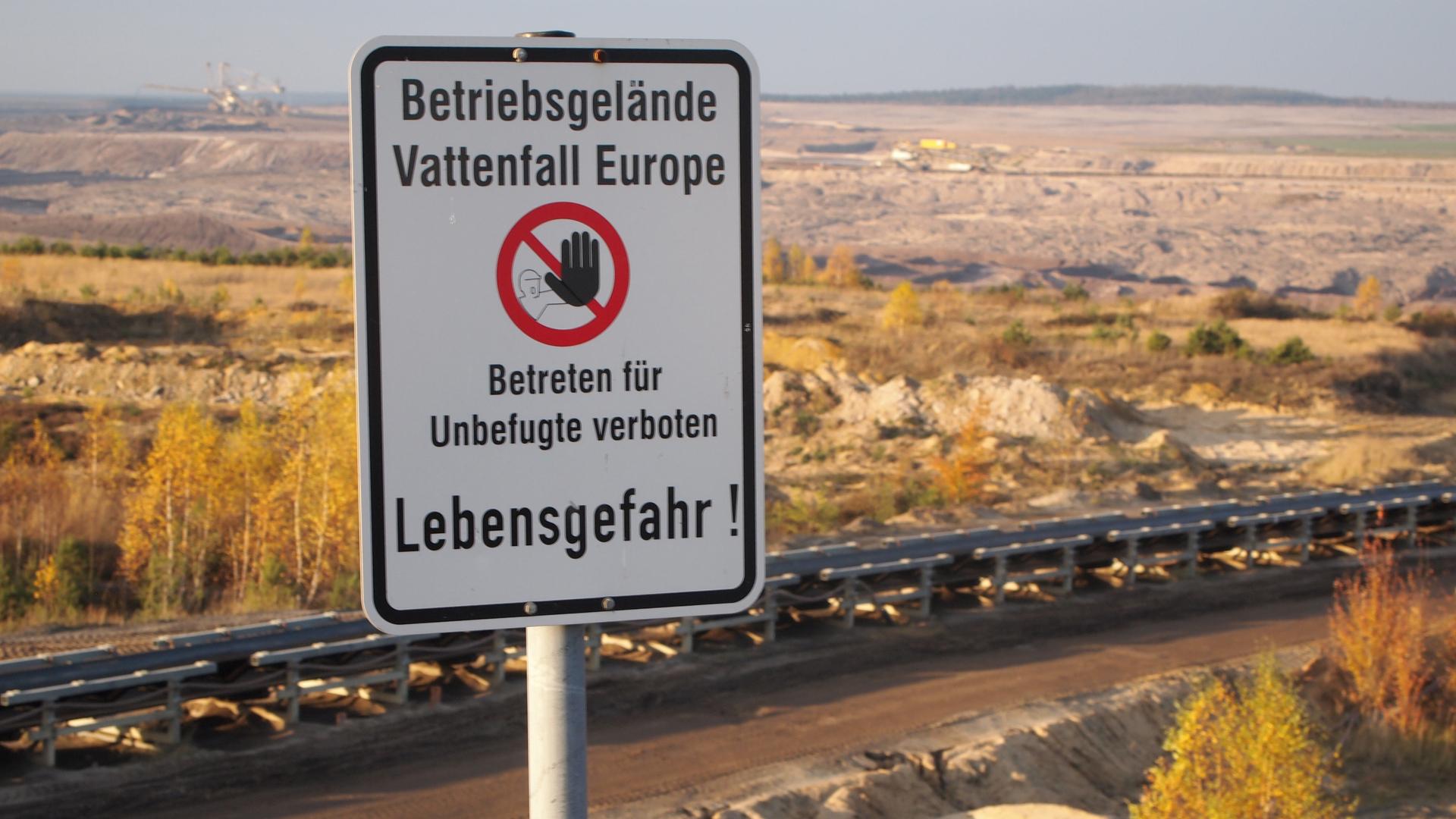Despite its green image, Germany still digs coal
A sign at a German lignite surface mine warns visitors to stay away from the edge of an overlook. A giant earth-moving machine sits on the far horizon.
Hans Kapelle’s farmhouse in the German state of Brandenburg southeast of Berlin is pretty cozy. He keeps the buildings warm and lit with a wood-burning stove inside and two sets of solar panels on the roof—on the east side for the morning sun, and on the west side for the afternoon sun,
It’s a balance of old and new that’s more and more common in Germany these days. Many homes, farms and businesses in this small town of Proschim are powered at least in part by solar and wind energy. There’s even a thriving community of green energy companies here.
But this outpost of Germany’s new energy economy is endangered by a holdover from its old energy economy.
At the edge of the garden outside his house, he gestures across the countryside toward a looming threat.
“The digger is currently in the East behind us,” Kapelle says. “They want to go to the west where coal is. That means it doesn’t matter if there’s coal here or not.”
The “digger” is a giant coal mining machine that may eventually rumble right through the entire town as it moves from one coal seam to another. There’s no coal below the Kapelles’ farmhouse, but they’d still have to relocate, along with more than three thousand residents in three villages.
Hans Kapelle’s son Andreas says the planned relocation has split both families and neighbors.
“The situation of coal mines destroyed the community,” he says.
Nearly 22,000 people work in coal and related industries in this part of Germany. So, the younger Kapelle says, “some people protect the coal mines, and some people fight to stay here.”
It sounds like a tale out of the last century, or before—entire towns being wiped out to dig up coal. And the law allowing coal companies to ask the government to move entire villages does go back to the 1940s, enacted by Adolph Hitler as a wartime measure to protect national security.
But today it’s a window into Germany’s 21st century energy dilemma.
“There is a gap of about a quarter of today’s energy generation that has to be filled,” says Thoralf Schirmer, a spokesman for the Swedish-owned energycompany Vattenfall, which wants to expand its mines near Proschim to feed nearby coal-fired power plants.
Germany has been a world leader in developing renewable energy. It also moved to quickly phase out nuclear power after the Fukushima disaster in 2011. But with nuclear on the wane and renewables still ramping up and relatively expensive, Schirmer says Germany needs the cheap, brown coal known as lignite around Proschim to keep electricity affordable.
Of course not everyone agrees
“It does not fit at all,” says Christian Hey, director of the German Advisory Council on the Environment, which advises the federal government. “Germany is committed to 85 to 90 percent carbon emissions and this cannot be achieved by coal.”
And Hey points out that lignite is an especially dirty form of coal, not to mention the environmental and human impact of scraping it out of the ground.
Polls show that Germans strongly support the country’s energy transition, or energiewende, but it has also brought complaints about the rising electricity prices.
Even people in the green energy business feel this tension.
Jan Ijspeert, who runs the Berlin company BAE Batterien, which manufactures batteries for solar power and other applications, says everybody in Germany is thinking green. “But if you feel it in your own wallet, if green energy is much more expensive, I don’t think private households are willing to pay.”
Improvements in energy efficiency are making renewables more competitive, but not enough to offset the demand for cheaper options like coal.
The Brandenburg state government will decide on Vattenfall’s proposed coal mine expansion and the relocation of Proschim’s 800 residents in February.
But Hans Kapelle says he won’t give up his solar-powered farm without a fight.
“You choose this place, you build up your house, you build up your living, and then somebody else is coming and decide that they want to have this as well. That’s unfair.”
